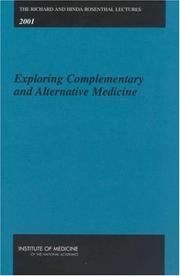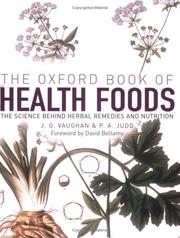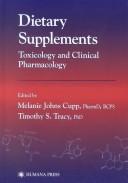| Listing 1 - 3 of 3 |
Sort by
|

ISBN: 0309085039 9786610209231 1280209232 0309500923 9780309500920 9780309085038 0305085039 0309168813 9781280209239 6610209235 Year: 2003 Publisher: Washington, D.C. : The National Academies Press,
Abstract | Keywords | Export | Availability | Bookmark
 Loading...
Loading...Choose an application
- Reference Manager
- EndNote
- RefWorks (Direct export to RefWorks)
Dietary supplements. --- Alternative medicine --- Diet supplements --- Food supplements --- Nutrient supplements --- Nutritional supplements --- Supplements, Nutritional --- Food additives --- Nutrition --- Vitamins

ISBN: 0192806807 019172730X 1280964936 0191513113 0198504594 9780191513114 9780191727306 9780192806802 9780198504597 0191647233 9780191647239 9781280964930 Year: 2003 Publisher: Oxford ; New York : Oxford University Press,
Abstract | Keywords | Export | Availability | Bookmark
 Loading...
Loading...Choose an application
- Reference Manager
- EndNote
- RefWorks (Direct export to RefWorks)
This text begins with an account of modern concepts of human nutrition, followed by a series of over 100 accounts of individual health foods and dietary supplements. The evidence for the claimed therapeutic value of herbal medicines is given.
Natural foods. --- Dietary supplements. --- Diet supplements --- Food supplements --- Nutrient supplements --- Nutritional supplements --- Supplements, Nutritional --- Food, Natural --- Health foods --- Natural food --- Organic food --- Organic foods --- Organically grown foods --- Whole foods --- Wholefood --- Food additives --- Nutrition --- Vitamins --- Food --- Dietary Supplements. --- Dietary Supplements --- Health food --- Natural foods --- Plants, edible --- Plants, medicinal --- Plants, Edible. --- Functional Food --- Plants, Edible --- Plants, Medicinal

ISBN: 158829014X 146849726X 9786610841899 1280841893 1592593038 9781588290144 Year: 2003 Publisher: Totowa, N.J.: Humana press,
Abstract | Keywords | Export | Availability | Bookmark
 Loading...
Loading...Choose an application
- Reference Manager
- EndNote
- RefWorks (Direct export to RefWorks)
While sales of dietary supplements have skyrocketed in recent years, information about their safety and efficacy in humans is generally sparse in comparison with what is available for prescription drugs. Dietary Supplements: Toxicology and Clinical Pharmacology presents, in both comprehensive and summary formats, a wealth of objective information for a selection of significant nonherbal dietary supplements. The supplements detailed were chosen for their popularity, toxicity, and the quantity and quality of information available, and include such well-known agents as DHEA, androstenedione and other over-the-counter steroids, coenzyme Q10, fish oil, glucosamine and chondroitin, chitosan, chromium picolinate, creatine, vanadyl sulfate, SAMe, and melatonin. Additional coverage is given to colloidal silver, shark cartilage, germanium, red yeast rice extract, l-tryptophan, N,N-dimethylglycine, GHB and GBL, huperzine, hydrazine, methylsulfonylmethane, and pyruvate. Each monograph discusses the history of the compound; its chemical structure; its current and promoted uses, sources, and chemical composition; and its toxicity, pharmacokinetics, and physiological role. Also presented are case reports of their adverse effects and interactions, as well as information on their reproductive effects, chemical and biofluid analysis, and regulatory status. Each chapter is based on original studies published in reputable peer-reviewed journals, as well as on meta-analyses, systematic reviews, or other high-quality assessments by recognized experts. Authoritative and objective, Dietary Supplements: Toxicology and Clinical Pharmacology offers physicians, pharmacologists, pharmacists, toxicologists, and medical examiners a treasure trove of uncommon-but reliable-scientific and clinical information on the toxicity and usefulness of today's leading nonherbal dietary supplements.
Nutritionary hygiene. Diet --- Pharmacology, Clinical --- Dietary Supplements --- Dietary supplements --- Physiological effect --- Toxicology --- Food --- Pharmacology --- Food and Beverages --- Health Occupations --- Biological Science Disciplines --- Natural Science Disciplines --- Disciplines and Occupations --- Technology, Industry, Agriculture --- Health & Biological Sciences --- Pharmacy, Therapeutics, & Pharmacology --- Pharmacology. --- Pharmacology/Toxicology. --- Drug effects --- Medical pharmacology --- Medical sciences --- Chemicals --- Chemotherapy --- Drugs --- Pharmacy --- Physiological effect. --- Diet supplements --- Food supplements --- Nutrient supplements --- Nutritional supplements --- Supplements, Nutritional --- Food additives --- Nutrition --- Vitamins --- Dietary supplements - Physiological effect --- Dietary supplements - Toxicology
| Listing 1 - 3 of 3 |
Sort by
|

 Search
Search Feedback
Feedback About UniCat
About UniCat  Help
Help News
News